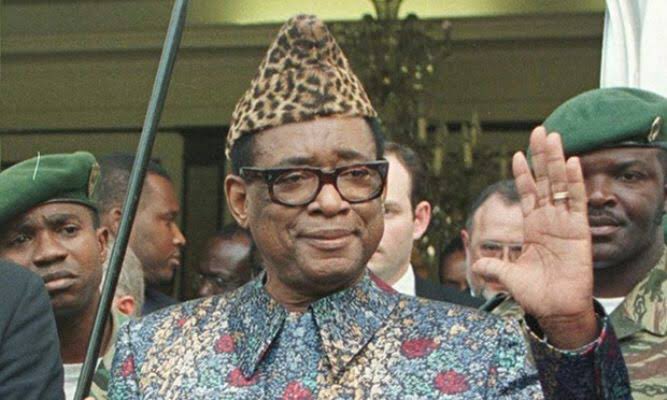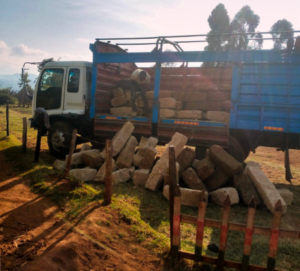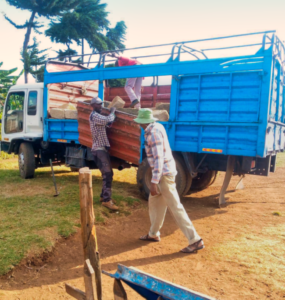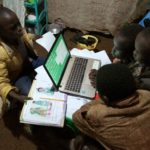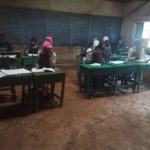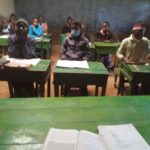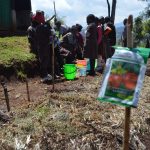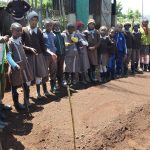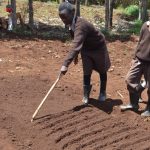
Mobutu Sese Seko was born Joseph Désiré Mobutu on 14 October 1930. Mobutu was supported by Belgian government and USA to depose the government of nationalist Patrice Lumumba in 1960. Mobutu installed the government that arranged for the execution of Patrice Lumumba in January 1961 as he was serving as Chief of Staff of the Army appointed by Lumumba himself.
Mobutu led yet another coup in 1965 where deposed Joseph Kasa-Vubu to become the country’s military dictator.
He established the popular movement of the revolution as the only party to consolidate his power. Mobutu changed the country’s name to Zaire in 1971. In 1972 he changed his own name to Mobutu Sese Seko.
Mobutu’s Leadership
Mobutu believed in his personal cult and he must be worshipped by the whole world. Mobutu, in order to bring power closer to him and centralised powers, he reduced the numbers of provinces.
In 1966 the Corps of Volunteers of the Republic was established, a vanguard movement designed to mobilise popular support behind Mobutu, who was proclaimed the nation’s “second National Hero” after Lumumba. He regularly present himself as the successor of Lumumba despite playing major role in his ouster and murder. He termed himself as successor to Lumumba’s legacy.
His majesty King Baudouin of the Belgians toured his country in 1970, in a highly successful state visit to Kinshasa. Presidential and legislative elections were held the same year where Mobutu was a sole candidate and MPR was the only party allowed to run even though constitution stated that at least two parties were allowed to run. Voting was not secret, voters chose a green if they supported Mobutu candidacy and red if they opposed. Casting a green was vote for hope, while red ballot was a vote for chaos. In most circumstances, Mobutu won by far more than 30,000 or more were not registered, he won by over 10 million votes.
To consolidate even more powers, Mobutu set up several military forces to protect him. These were Special Presidential Division, Civil Guard and Service for Action and Military intelligence (SNIP).
On his campaign of pro-Africa cultural awareness, Mobutu began renaming cities that reflected colonial past. Leopoldville became Kinshasa, Elisabethville became Lubumbashi and Stanleyville became Kisangani. In 1971, he renamed the country Republic of Zaire. He ordered the people to change their European names to African ones, priest were warned that they would spend five years in prison if they were caught baptizing a Zairian child with a European names. Western attires and ties were banned.
In 1972, he renamed himself Mobutu Sese Seko Nkudu Ngbendu Wa Za Banga (Meaning, the all -powerfu warrior who, because of his endurance and inflexible will to win, goes from conquest, leaving fire in his wake.”)
In 1974, Mobutu consolidated power in a new constitution. Defined MPR as the “single institution” in the country. It was officially defined as “the nation politically organised.” All citizens became automatically members of the MPR from birth.
During early years of his rule, Mobutu consolidated power by publicly executing political rivals, secessionists, coup plotters, and all other possible threats. Many were hanged before large audience to set an example. Former Prime Minister Evariste Kimba, together with three cabinet members, Jerome Anany (Defence Minister), Emanuel Bamba (Finance Minister), and Akexandre Mahamba (Minister of Mines and Energy) were tried on May 30 1966 and sent to the gallows before the audience of 50,000 spectators. The men were executed on charges of being in contact with Colonel Alphonse Bangala and Major Pierre Efoni, in a bid to plan a coup. Mobutu explained the executions as follows: “One had to strike through a spectacular example, and create the conditions of regime discipline. When a chief takes a decision, he decides – period.” Mobutu converted much opposition into submission through patronage, those he could not do, he dealt with them forcefully. Uprisings by former Katangan gendermeries were crushed and Stanleyville mutinies were crushed with force. By 1970, all possible threats to his rule was smashed, law and order was brought to nearly all parts of the country.
Pierre Mulele, Lumumba’s Minister of Education and rebel leader during 1964 Simba Rebellion, was lured out of exile in Brazzaville in 1968 on condition that he would receive amnesty. Instead he was tortured and killed by Mobutu’s forces. Before he died, Mulele, while still alive, his eyes were removed out, his genitals were ripped off, and his limbs were amputated one by one.
In 1972, Mobutu tried unsuccessfully to be named president for life. In May 1983, he raised himself to the rank of Marshal.
Mobutu nationalised foreign owned firms and forced European out so that he can gain revenues for Congolese resources, he handed the managements of most of the firms to relatives and close associates who quickly exercised corruptions and enriched themselves too. By 1977, Mobutu was forced to call back investors due economic slump. Katangan rebels based in Angola, invaded Zaire that same year in retaliation of Mobutu’s support of ant-MPLA rebels. France responded by airlifting 1,500 Moroccan paratroopers into the country and repulsed rebels ending Shaba I. In 1978, rebels attacked Zaire again in then greater numbers, it was later named Shaba II. The governments of Belgium and France deployed troops supported by USA’s logistics and defeated the rebels again.
Personal Fortunes
Mobutu was re-elected as single candidate participated in elections in 1977 and 1984. He amassed so much wealth which was estimated as between $5billion to $15 billion. Most of it was held in Swiss banks. He held more than his county’s debt that time.
Mobutu owned a fleet of Mercedes Benz vehicles that he used to travel between his several palaces, while many roads in the country deteriorated and majority of people starved. The infrastructure collapsed, many workers went months without paid. Most of the money was siphoned off by Mobutu, his family and top political and military officials. Those who ensured his safety were the ones who were paid adequately and regularly.
During his reign, Democratic Republic of Congo experienced hyperinflation, culture of dishonesty and corruption were norm among all public servants.
In order to feed his opulent lifestyle, Mobutu erected a palace in Gbadolite named “Versailles of the Jungle”. There he had an airport with a runway long enough to accommodate the Concorde’s extended take off and landing requirements, where he would charter a Concorde from Air France to go shopping in France and other functions.
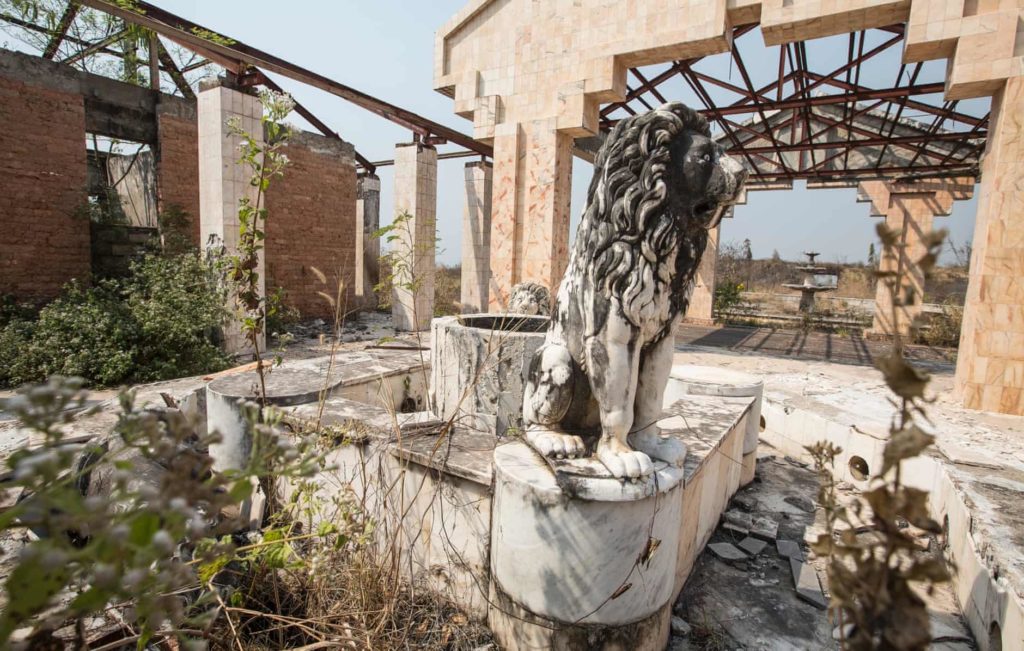
Mobutu’s rule is one example of kleptocracy and nepotism being practical in Africa from 1960s to date. Members of tribe and families were awarded top positions in military and government, he groomed his eldest son to succeed him as president but he died from AIDs in 1994.
His totalitarian regime was responsible for numerous human rights violations. His one of the pervasive personality of cult was that during Congolese evening news on television was preceded by an image of him descending through clouds like a god.
He held such titles as “Father of the Nation”, “Messiah”, “Guide of the Revolution”, “Helmsman”, “Founder”, “Savior of the People”, and “Supreme Combatant”. In the 1996 documentary of the 1974 Foreman-Ali fight in Zaire, dancers receiving the fighters can be heard chanting “Sese Seko, Sese Seko”. At one point, in early 1975, the media were forbidden to refer to anyone other than Mobutu by name; others were referred to only by the positions they held. Despite the fact almost all the population of Congolese was living in dare poverty, Mobutu was a “messiah.”
Mobutu gained support from the West and one of its international organisation such as the International Monetary Funds.
Mobutu was a staunch anti-communist, the reason he amassed so much wealth at the expense of starving poor, in his policy of supporting capitalism ideologies.
Mobutu tried to launch an ill-fated, pre-empitive invasion of Angola in a bid to install a pro-Kinshasa government during when Angola was fighting a civil war, but was easily repulsed by Cuban troops.
Overthrew
Mobutu was the victim of world’s one superpower, he was orphaned by USA after the end of Cold War exposing him to his internal enemies he suppressed for decades, Mobutu too became vulnerable from external attacks from his longtime regional enemies who happened to be Democratic Republic of Congo’s neighbours, Paul Kagame of Rwanda, Yoweri Museveni of Uganda and Dos Santos of Angola. Mobutu too supported the apertheid government of South Africa, by that time South Africa was not under the apertheid rule, Mobutu had no survival chances.
Mobutu foolishly ordered Tutsis to leave Zaire in November 1996 on penalty of death if they will not leave, the Banyamulenge, an ethnic of Tutsi were the basis of rebellion. This was the beginning of his troubles. From eastern Zaire, the rebels aided by Yoweri Museveni, President of Uganda and Rwandan Paul Kagame launched an offensive to overthrow Mobutu from west, other locals opposed to him led by Laurent Désiré Kabila joined forces and march west toward Kinshasa. Burundi and Angola also supported the growing rebellion which came to be known as the First Congo War.
Ailing from the last stage of prostate cancer, Mobutu was in Switzerland for treatment, he was unable to coordinate the resistance.
By last quarter of 1997, Kabila forces were in advance stages of taking Kinshasa. Mobutu fled into exile. Kabila’s forces Alliance of Democratic Forces for the Liberation of Congo (AFDL) proclaimed the victory next day. If not for the county’s deplorable roads and no paved roads in some areas, AFDL would have overrun the country sooner.
Mobutu died in Rabat Morocco three months later and buried there.

